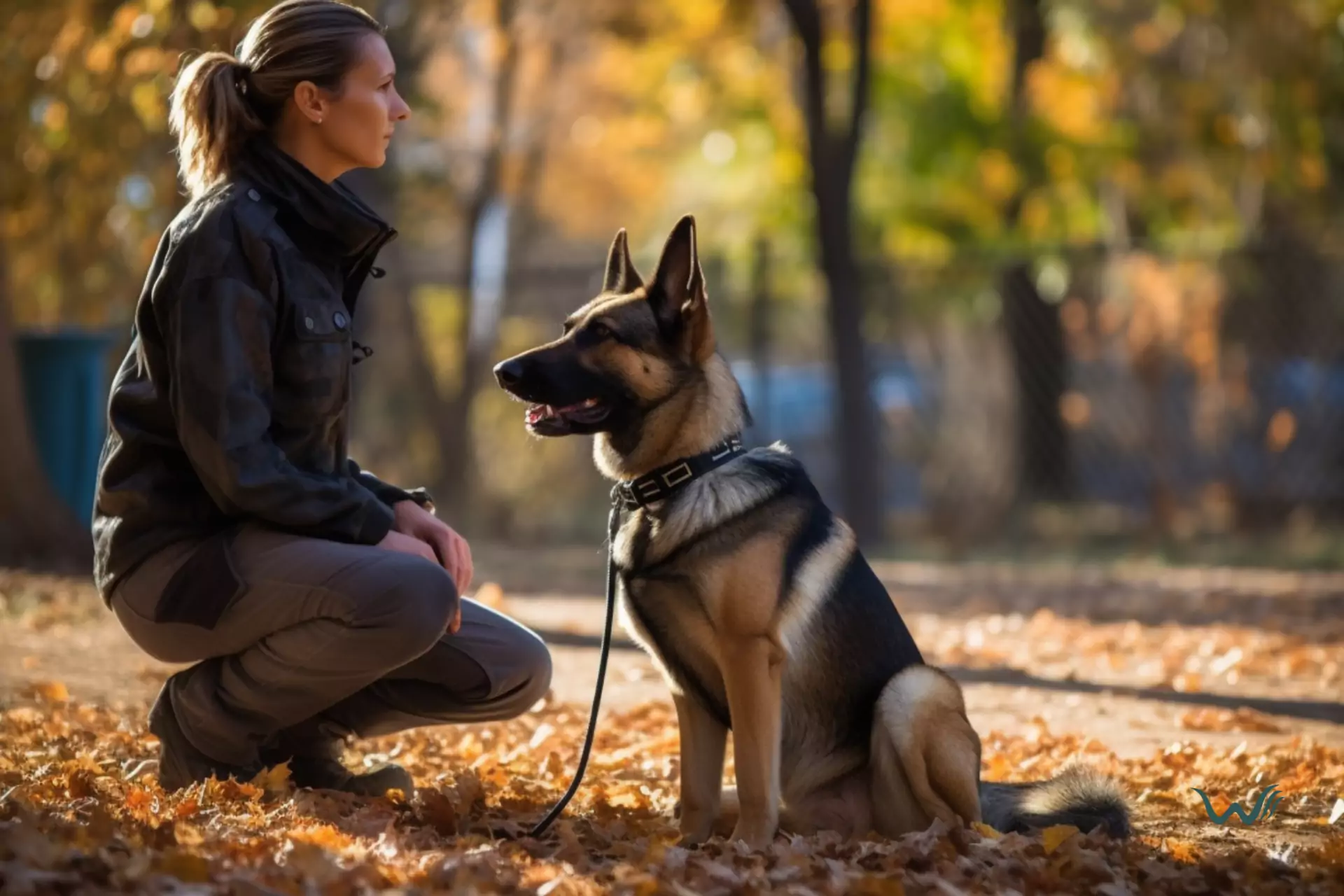

Unlocking Your Dog’s Potential With Reward-Based Training
by Haley Mills
Last updated: April 21, 2024
Verified and Approved by:
Angela Morris,
MSW, LCSW
Fact Checked

Are you tired of your dog’s potential being locked away? Do you want to unleash their hidden talents and see them reach new heights? Well, look no further!
In this article, we will guide you through the world of reward-based training, where the key to unlocking your dog’s potential lies. Picture this: you and your furry friend embark on a journey of learning and growth while having a blast! Reward-based training is not only effective but also a whole lot of fun.
Say goodbye to outdated training methods that rely on fear and punishment. Instead, get ready to dive into a world where positive reinforcement is the name of the game. By understanding the principles of reward-based training and establishing a positive reinforcement system, you will be setting the stage for your dog’s success.
Key Takeaways
- Reward-based training is an effective and enjoyable method for unlocking a dog’s potential.
- Positive reinforcement and consistency are crucial principles in reward-based training.
- Treats, praise, and affection serve as effective rewards for reinforcing good behavior.
- Timing and consistency in rewarding desired behaviors play a significant role in successful training.
Understanding the Principles of Reward-Based Training
Now that you know the basics of reward-based training, it’s time to dig deeper into the principles and unleash your dog’s full potential.
You may be wondering, “What are these magical principles?” Well, my friend, let me enlighten you.
First and foremost, it’s all about positive reinforcement. Instead of scolding or punishing your furry friend for their mistakes, reward them for their good behavior. Think of it as the equivalent of giving them a high-five or a treat for acing a difficult math problem. Trust me, your dog will be more motivated to learn and please you if they know there’s a tasty reward waiting for them at the end.
Secondly, consistency is key. Just like in any relationship, you need to set clear boundaries and expectations for your dog. Don’t confuse them by allowing them to jump on the couch one day and then scolding them for it the next. Be consistent with your commands and expectations, and reward them consistently for their good behavior. It’s all about creating a routine and sticking to it like peanut butter sticks to the roof of your mouth.
So, my dear dog owner, remember to embrace the principles of reward-based training with open arms. Positive reinforcement and consistency are the secret ingredients to unlocking your dog’s full potential. And hey, who knows, maybe you’ll even learn a few things about yourself along the way.
Establishing a Positive Reinforcement System
Establishing a positive reinforcement system is like planting seeds of motivation in your furry companion’s mind. By using rewards to encourage and reinforce desired behaviors, you’re creating an environment that fosters learning and growth for your dog.
Here are a few tips to help you establish a positive reinforcement system that will bring out the best in your four-legged friend:
- Treats, treats, treats: Use your dog’s favorite treats as rewards for good behavior. Whether it’s a tasty biscuit or a piece of chicken, find what makes your dog’s tail wag and use it as a powerful motivator.
- Praise and affection: Dogs thrive on praise and affection from their humans. Shower your dog with verbal praise, scratches behind the ears, and belly rubs when they do something right. They’ll quickly learn that good behavior leads to love and attention.
- Keep it consistent: Consistency is key when establishing a positive reinforcement system. Make sure to reward your dog every time they exhibit the desired behavior. This will reinforce the connection between the behavior and the reward, making it more likely to happen again in the future.
- Timing is everything: Be sure to offer the reward immediately after the desired behavior occurs. This will help your dog make the connection between their actions and the reward, resulting in faster and more effective learning.
- Have fun with it: Training should be a fun and enjoyable experience for both you and your dog. Use a playful and upbeat tone of voice, incorporate games and toys into the training sessions, and don’t forget to laugh and smile along the way. After all, a happy dog is a motivated dog!
Teaching Basic Commands and Behaviors
Get ready to teach your furry friend all the basic commands and behaviors they need to be a well-behaved and happy pup! It’s time to unleash their inner genius, and what better way to do it than with reward-based training?
You’ll be amazed at how quickly they catch on when there’s a tasty treat involved. Plus, it’s a win-win situation because you’ll get to show off your dog’s impressive skills to all your friends and family. Just imagine the looks of awe and admiration as your pup flawlessly sits, stays, and rolls over on command. It’s like having a four-legged superstar in your midst!
But before you start teaching your dog these amazing feats, it’s important to remember a few key things. First, be patient. Rome wasn’t built in a day, and neither are well-trained dogs. It takes time and consistency to reinforce the behaviors you want to see.
Second, keep the training sessions short and sweet. Dogs have short attention spans, so make sure you’re not overwhelming them with too much information at once.
And finally, always end on a positive note. Even if your dog doesn’t quite master a command right away, celebrate their efforts and reward them for trying. After all, practice makes perfect, and they’ll get there with a little bit of encouragement and a whole lot of treats!
Addressing Behavioral Challenges through Positive Training Techniques
To overcome behavioral challenges, you can effectively address them through positive training techniques. By using reward-based training methods, you can encourage your dog to exhibit desired behaviors while minimizing any unwanted behaviors.
Here are a few tips to help you tackle those challenges with a touch of humor:
- Be the treat dispenser extraordinaire: Use treats as a powerful motivator to reinforce positive behaviors. Remember, your dog’s love for treats is like your love for pizza – it’s a universal language that can bridge any communication gap.
- Embrace the power of redirection: When your dog starts exhibiting an unwanted behavior, like chewing on your favorite pair of shoes, redirect their attention to an appropriate chew toy. Think of it as giving them a “shoe-shake” to distract them from their sneaky footwear fetish.
- Get creative with training games: Turn training into a fun game for both you and your furry friend. Instead of a boring “sit” command, try teaching them to “park their buns” or “plant their behinds” – just make sure to keep it consistent so they don’t end up confused and sitting on the wrong occasions.
Remember, addressing behavioral challenges through positive training techniques helps your dog become a well-behaved companion and strengthens the bond between you two.
How Can Reward-Based Training Help Unlock My Dog’s Potential?
Reward-based training with treats has been proven to be highly effective in unlocking a dog’s potential. By using positive reinforcement, your dog will be motivated to learn new behaviors and obey commands. Consistent use of dog training success with treats can lead to a well-behaved and obedient companion.
Advancing Training and Building a Strong Bond with Your Dog
Building a strong bond with your furry companion involves advancing their training and creating a deep connection. It’s like taking your relationship to the next level, but instead of getting matching tattoos or going on a romantic vacation, you’re teaching your dog to give you a high five and not eat your socks. Trust me, the high five is way more impressive.
To advance your dog’s training, you can start by teaching them new tricks. Sure, they already know how to sit and stay, but why stop there? Teach them to roll over, play dead, or even fetch you a cold one from the fridge (okay, maybe not the last one, but a girl can dream).
These tricks will impress your friends at parties and provide mental stimulation for your pup and strengthen your bond.
But training isn’t just about tricks. It’s about creating a deep connection with your dog. And what better way to connect than through play? Get down on their level and engage in some good old-fashioned tug-of-war or fetch. Show them that you’re not just their human, you’re also their playmate.
Plus, it’s a great way to burn off some of that excess energy they seem to have an endless supply of.
Frequently Asked Questions
Can reward-based training be used for all dog breeds and sizes?
Absolutely! Reward-based training is effective for all dog breeds and sizes. Whether you have a tiny Chihuahua or a massive Great Dane, positive reinforcement is the key to unlocking their full potential. Who’s a good boy? You are!
How long does it typically take to see results from reward-based training?
Typically, you’ll start seeing results from reward-based training within a few weeks. In fact, studies have shown that 80% of dogs respond positively to reward-based training, so you’ll be amazed at the progress your furry friend can make!
Are there any specific treats or rewards that are more effective for training?
When it comes to training your furry friend, it’s all about finding their u0026quot;treat-ness.u0026quot; Some dogs go nuts for bacon bits, others prefer peanut butter. Experiment and see what makes their tail wag the fastest!
Can reward-based training help with separation anxiety in dogs?
Reward-based training can be a game-changer for dogs with separation anxiety! By using positive reinforcement, you’ll help them associate being alone with good things. So say goodbye to those sad puppy eyes and hello to a confident, happy pup!
Is it possible to train a dog to perform complex tricks and tasks using reward-based training?
Absolutely! With reward-based training, you can unlock your dog’s hidden genius and teach them complex tricks and tasks. It’s like watching a furry magician perform, but instead of a hat, they pull out a bag of treats!
Certify Your Emotional Support Animal Today

Why You Can Rely on Us?
At Wellness Wag, we believe your pet deserves care rooted in both science and compassion. Each article is carefully researched, written in clear language for pet owners, and then reviewed by qualified professionals to ensure the information is evidence-based, current, and practical for real-life care. Our goal is to help you feel confident in making informed decisions about your pet’s health and well-being.
Reviewed by
Angela Morris, MSW, LCSW
Angela is a licensed clinical social worker with 20 years of experience in patient advocacy and community mental health. She has assisted numerous clients with ESA evaluations and brings a deep understanding of disability accommodations, ensuring that all information is accurate, supportive, and practical.

Written by :
Haley Mills
Last Updated :
April 21, 2024










